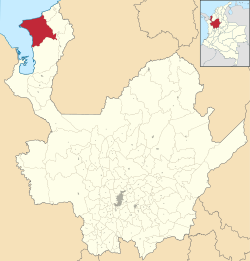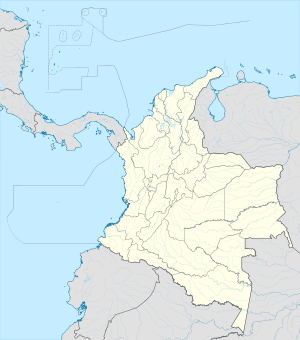Necoclí
Necoclí | |
|---|---|
Municipality and town | |
 Location of the municipality and town of Necoclí in the Antioquia Department of Colombia | |
| Coordinates: 8°25′0″N 76°47′0″W / 8.41667°N 76.78333°W | |
| Country | |
| Department | |
| Subregion | Urabá |
| Population (2020 est.[1]) | |
• Total | 70,824 |
| Time zone | UTC-5 (Colombia Standard Time) |
Necoclí is a town and municipality in Antioquia Department, Colombia. Located on the eastern shore of the Gulf of Urabá, it is part of the Urabá Antioquia sub-region. The population is predominantly Afro-Colombian.[2]
It was founded as a Spanish city called San Sebastián de Buena Vista. One of Colombia's oldest towns, it was founded in 1509[2] by Pedro de Heredia, who died in 1555.
Some early reports of the town can be found in chapter 9 of Pedro Cieza de León's Crónica del Perú (1553).
Necoclí Airport is a general aviation airport, without scheduled flights. Buses link the town with Cartagena, the department capital of Medellín, and other points. There are scheduled launches to two towns without road access, Capurganá and Acandí, across the gulf and near the Panamanian border.
2021 deluge of Haitian migrants
The town is as close to Panama as one can get by road from the south, and serves as an impromptu staging ground for migrants attempting to cross the Gulf of Urabá to Capurganá, and from there by hiking through the Darién Gap into Panama, en route to the United States. While the population of Necoclí is about 20,000, about 25,000 migrants, 75% of which were Haitian, passed through Necoclí between January and August, 2021. The number of migrants arriving exceeded the capacity of the ferries across the Gulf of Urabá, causing extended waits for a free seat. In August 2021 there were some 10,000 migrants sleeping in hostels, churches, or on the beach. The town's water system collapsed, unable to handle the increased load. The mayor proclaimed a state of emergency ("calamidad pública").[3][4][5]
Demographics
Total population: 42,281 hab. (2018)
- Urban Population: 21,995
- Rural Population: 20,326
Literacy: 76.8% (2005)[6]
- Urban area: 88.6%
- Rural area: 73.1%
Ethnography
According to the figures presented by DANE in the 2005 census, the ethnographic composition[6] of the municipality is:
- Afro-descendants (59.0%).
Historical population Year Pop. ±% 1964 9,456 — 1973 13,716 +45.1% 1985 27,689 +101.9% 1993 34,198 +23.5% 2005 47,989 +40.3% 2018 42,281 −11.9% - Mestizos and whites (37.5%).
- Indigenous (3.5%).
Climate
Necoclí has a tropical monsoon climate (Am)What is this an abbreviation for? with moderate rainfall from January to March and heavy rainfall in the remaining months.
| Climate data for Necoclí (Mellito El), elevation 10 m (33 ft), (1981–2010) | |||||||||||||
|---|---|---|---|---|---|---|---|---|---|---|---|---|---|
| Month | Jan | Feb | Mar | Apr | May | Jun | Jul | Aug | Sep | Oct | Nov | Dec | Year |
| Mean daily maximum °C (°F) | 30.8 (87.4) |
31.1 (88.0) |
31.0 (87.8) |
31.3 (88.3) |
31.2 (88.2) |
31.3 (88.3) |
31.2 (88.2) |
31.2 (88.2) |
31.1 (88.0) |
31.3 (88.3) |
30.9 (87.6) |
30.9 (87.6) |
31.1 (88.0) |
| Daily mean °C (°F) | 26.6 (79.9) |
26.8 (80.2) |
27.1 (80.8) |
27.4 (81.3) |
27.2 (81.0) |
27.0 (80.6) |
27.0 (80.6) |
27.0 (80.6) |
26.9 (80.4) |
26.9 (80.4) |
26.8 (80.2) |
26.6 (79.9) |
26.9 (80.4) |
| Mean daily minimum °C (°F) | 22.6 (72.7) |
23.6 (74.5) |
24.1 (75.4) |
24.5 (76.1) |
24.1 (75.4) |
23.6 (74.5) |
23.3 (73.9) |
23.3 (73.9) |
23.3 (73.9) |
23.4 (74.1) |
23.4 (74.1) |
23.3 (73.9) |
23.5 (74.3) |
| Average precipitation mm (inches) | 51.0 (2.01) |
65.3 (2.57) |
82.2 (3.24) |
208.1 (8.19) |
205.6 (8.09) |
180.0 (7.09) |
185.6 (7.31) |
205.5 (8.09) |
186.9 (7.36) |
181.0 (7.13) |
208.0 (8.19) |
132.7 (5.22) |
1,886.4 (74.27) |
| Average precipitation days (≥ 1.0 mm) | 6 | 5 | 8 | 12 | 15 | 14 | 14 | 16 | 14 | 15 | 14 | 10 | 138 |
| Average relative humidity (%) | 86 | 84 | 84 | 85 | 87 | 87 | 87 | 87 | 87 | 87 | 87 | 87 | 86 |
| Mean monthly sunshine hours | 186.0 | 158.1 | 148.8 | 123.0 | 117.8 | 111.0 | 136.4 | 136.4 | 129.0 | 142.6 | 153.0 | 164.3 | 1,706.4 |
| Mean daily sunshine hours | 6.0 | 5.6 | 4.8 | 4.1 | 3.8 | 3.7 | 4.4 | 4.4 | 4.3 | 4.6 | 5.1 | 5.3 | 4.7 |
| Source: Instituto de Hidrologia Meteorologia y Estudios Ambientales[7] | |||||||||||||
See also
References
- ^ "Resultados y proyecciones (2005-2020) del censo 2005". Archived from the original on 23 September 2015. Retrieved 12 April 2020.
- ^ a b Heyden, Tom (May 10, 2011). "Necocli: Crabs, coconuts and volcano swimming". Colombia Reports. Archived from the original on 2017-04-30. Retrieved 2012-07-08.
- ^ "Colombia reports almost 700 migrants stranded in Caribbean region". Reuters. 29 January 2021. Archived from the original on 29 January 2021. Retrieved January 29, 2021.
- ^ Turkewitz, Julie; Kitroeff, Natalie; Villamil, Sofía; Rios, Federico (2021-10-02). "Perilous, Roadless Jungle Becomes a Path of Desperate Hope". The New York Times. ISSN 0362-4331. Archived from the original on 2021-10-03. Retrieved 2021-10-03.
- ^ Daniels, Joe Parkin (2021-08-08). "If I go back, I'll die': Colombian town scrambles to accommodate 10,000 migrants". The Guardian. Archived from the original on 2021-10-03. Retrieved 2021-10-03.
- ^ a b "Distribution of population and area into predominantly urban, intermediate and predominantly rural regions; 2005". 2009-03-23. doi:10.1787/reg_glance-2009-graph8_3-en.
{{cite journal}}: Cite journal requires|journal=(help) - ^ "Promedios Climatológicos 1981–2010" (in Spanish). Instituto de Hidrologia Meteorologia y Estudios Ambientales. Archived from the original on 15 August 2016. Retrieved 3 June 2024.
Further reading
- Oquendo B., Catalina (March 7, 2007). "Necoclí, la tierra a donde llegaron los conquistadores". El Tiempo (Colombia). Archived from the original on 2007-03-10.


